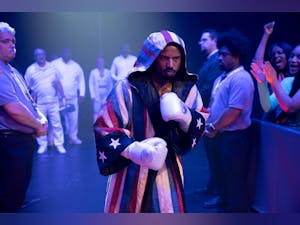From: Silver Screen
‘The Paris Opera’ hits all the right notes

The latest shows and movies coming to a screen near you.
Imagine a major terrorist attack happening on the day of your final dress rehearsal, for the first production of the season at one of your theaters, the Bastille Opera. Do you go on with the show? How do you address the situation? How can you push aside your grief and tell a story? Stéphane Lissner, the director of L’Opera National de Paris, decided that the final dress for the ballet “La Báyadere” would go on despite the Charlie Hebdo terrorist attacks that occurred that morning, and addressed the audience with class at the curtain call, asking for a moment of silence.
“Above all, there is no better response than to perform, perform, and keep on performing,” Lissner said in the film. “We must show the terrorists, by raising the curtain, that the world of live performance and culture is stronger than their barbarity.”
In “The Paris Opera,” or “L’Opera” as it is referred to in French, legendary Swiss filmmaker Jean-Stéphane Bron seamlessly connects the many different stories of the L’Opera National de Paris in 2015, during Lissner’s first year serving as the director. He follows a wide variety of people working at L’Opera in this French language documentary, from the costumers and cleaners to the directors and performers, giving audiences a look at what it’s like behind the scenes at one of the most preeminent opera companies in the world.
Case in point: the previously mentioned moment of silence. During the moment of silence, the camera panned over to show not just the cast and the audience paying their respects; it also cut to reveal workers backstage, in the control room and even in the kitchen, all standing in silence and showing their solidarity for the victims. This truly demonstrated the power of music and the kind of loving community it creates.
The story of Lissner’s trials and tribulations that arose during his pivotal first year is masterfully told; audiences will feel for Lissner as he tries to increase the relevance of the arts and make opera more accessible and appealing for audiences, but often faces obstacles. From labor disputes with the musicians’ union to the struggle of acquiring and maintaining a live bull for “Moses und Aaron,” Lissner’s struggles have no bounds. However, Lissner’s handling of various PR nightmares -- including dance director Benjamin Millepied’s fall from grace when he leaves -- are the best moments, as they exhibited his interactions with the outside world and revealed how he handled the pressures of his job with poise.
Various other perspectives are also explored, but the stories of 21-year-old Russian bass-baritone Mikhail Timosheko who is studying at L’Opera’s academy for rising musicians, the music director Philippe Jordan who conducts the orchestra with sheer intensity and ardor, and the young children in a youth orchestra learning from the best L’Opera has to offer them are the most intriguing due to their powerful journeys throughout the film. All the while, cameos from famous opera singers such as bass-baritone Bryn Terfel and soprano Olga Peretyako are ones that opera-loving audiences may adore, as they wonder how these legends will interact with this colorful cast of characters.
Terfel’s interactions with Timosheko are especially heart-warming, as he encourages the young singer to continue his work. As Terfel is interviewed backstage, he mentions his hopes for Timosheko. “He’s in the same boat as me,” he says -- and Timosheko looks on from the side with wonder in his eyes, honored that one of his idols views him as an equal. Throughout the documentary, Timosheko struggles to learn French and grow as a musician, and those words clearly had a powerful effect on him. By the end of the film, when he makes his debut with L’Opera, he has developed into a musician to be reckoned with and the passion in his eyes as he sings is inspiring.
Through these stories and stunning cinematography, audiences receive a special, intimate backstage experience of L’Opera unlike any other. One particular moment in which the stage manager calls the opening night of “Moses und Aaron” stands out as the best example revealing the inner workings of an opera company. Audiences experience her bird’s eye view of the theater as she peers from her position in the box with the sound and light boards, revealing the massive amount of the seats in audience and the full stage all in the same shot. It’s truly a sight to behold.
Even for people who may not think that opera is their thing, this film is a worthwhile watch. This film truly reveals the level of intricacy that comes with running an opera company in a highly relatable way. The stories of love, hope, persistence and life within this company are stories that anyone can relate to. Move past your preconceived notions about this art form, adapt to hearing the beautiful French language and enjoy the opera. You won’t be disappointed.
Grade: A-
The Paris Opera was released in Washington, D.C. on Friday, Oct. 27. Its limited engagement is at Landmark Theatres E Street Cinema and ends on Thursday, Nov. 2.




